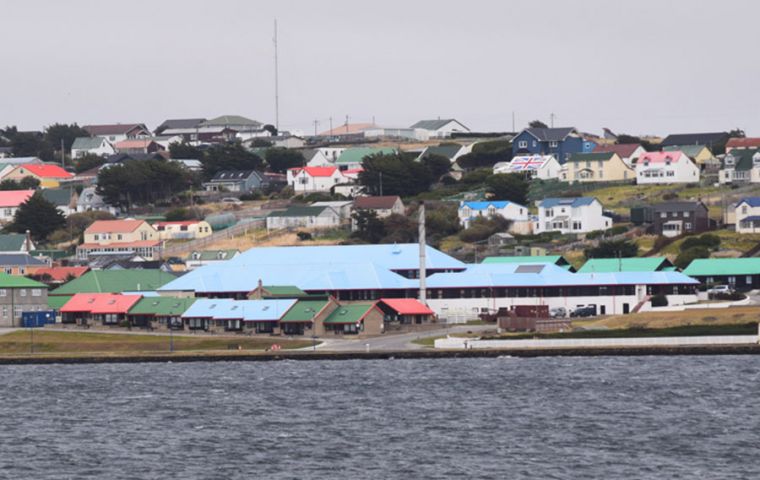MercoPress. South Atlantic News Agency
Falklands' health service preparing for a Brexit impact on medical supplies
 KEMH has made contacts with potential suppliers from Turkey, South Africa and Clinica Alemana in Santiago de Chile
KEMH has made contacts with potential suppliers from Turkey, South Africa and Clinica Alemana in Santiago de Chile  Chief Medical Officer Dr Rebecca Edwards said it will be unavoidable, “that some drugs lines will likely be short of stock. It is difficult to predict which ones though.”
Chief Medical Officer Dr Rebecca Edwards said it will be unavoidable, “that some drugs lines will likely be short of stock. It is difficult to predict which ones though.” Brexit will hit the supply of medicines to the Falkland Islands, however, it is unclear to what extent, indicated Falklands Chief Medical Officer Dr Rebecca Edwards to Penguin News this week.
A no-deal departure from the EU could result in severe disruptions to medical supplies to the UK, it was reported recently, and late last year emergency plans were being laid to ensure UK hospitals remained stocked amid six months of expected chaos at Britain’s channel ports.
Penguin News asked the Chief Medical Officer how the situation might impact on the supply of medicines to the Falklands and what was being done to mitigate any problems.
Dr Edwards said: “Realistically, until Brexit is finalized (deal or no deal) and we have a better understanding of what trade deals will still stand between European drugs companies and the UK, we won’t have a clear picture regarding the impact that Brexit will have on our medicines supply.”
She said however that it was to be expected, and will be unavoidable, “that some drugs lines will likely be short of stock. It is difficult to predict which ones though.”
She said: “There have been various lists of medicines sent out that the UK think might become depleted - however it is worth noting that this list changes and is not exhaustive.”
She said the UK was trying to stockpile medicines that they potentially see as problematic to source and, “we hope to hold extra stock of the more common meds we use too.”
At the same time, storage and transport remained the difficulty in the Falkland Islands. “We already have difficulty stocking particular lines and this will probably just become more difficult into the future until the UK and Europe has sorted out its business,” said Dr Edwards.
She explained the difficulty was caused because all drugs had a shelf-life, and when they ordered medicines, “we can't demand the ones with the longest life.”
She said: “We will do all we can to hold extra drugs of the commonest ones used, but until the business is organized, we can't promise that we won't run out of some things.”
Providing information from hospital pharmacist John Woollacott, Dr Edwards said KEMH now had an account with a supplier in Istanbul, Turkey.
“He has checked out their credentials with the British Consulate and on the Turkish Healthcare regulation website. It seems it’s actually a good solution as Turkey has a lot of regulatory alignment to the EU without actually being in the EU. Prices are good for branded items and they will send English language leaflets.”
She added that: “John also has contacts in Chile and we can get some bits from Clinica Alemana if needed. He also has links with some suppliers in South Africa too if we need to reach out further.”
She reassured: “John is already trying to stockpile limited lines to avoid problems, although it is inevitable that we will have stock supply issues to some degree.”
NHS users in the UK and private prescription services have been warned that interruption to the supply of medicines means customers might not be able to get their usual prescriptions but pharmacies were committed to finding ways to reduce the impact on patients.
It has been suggested patients talk to their GPs about what measures they might take to brace themselves for a gap in availability of their usual medicines, and what they might take instead.
An article in the Independent recently said ministers had already told drug manufacturers to build six-week stockpiles in anticipation of Brexit customs disruption, but after the new assessment indicated Brexit disorder could last six months, further measures were deemed necessary.
In a letter to pharmaceutical firms, Health Secretary Matt Hancock said: “The revised cross-government planning assumptions show that there will be significantly reduced access across the short straits, for up to six months.
“This is very much a worst case scenario; however, as a responsible government, we have a duty to plan for all scenarios.” (Penguin News)




Top Comments
Disclaimer & comment rules-

-

Read all commentsShame on the EU if they put tariffs on medicines.
Jan 11th, 2019 - 10:58 am -1They are not putting tariffs on medicines. The problems are regulatory alignment - but we can keep following EU rules for a year or two - and bottlenecks at the ports. Most UK medicines are made in the EU and will be affected by the inevitable gridlock once customs checks begin. And there is not enough manufacturing capacity in the UK to take over.
Jan 11th, 2019 - 12:25 pm -1I have one prescription and I just renewed it early, so that I could have an emergency supply. But the real problem is medicines with a short shelf life; no one can stockpile them.
By the way, the European Medicines Agency was based in London, and is moving to Ámsterdam with the loss of 1000 jobs. And our own Medicines Agency has already lost all its European contracts because we will be leaving the EU.
Commenting for this story is now closed.
If you have a Facebook account, become a fan and comment on our Facebook Page!